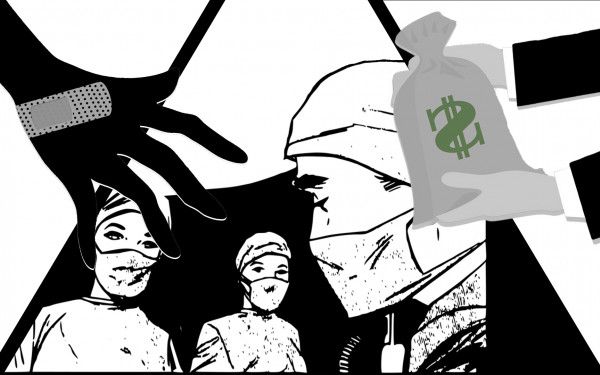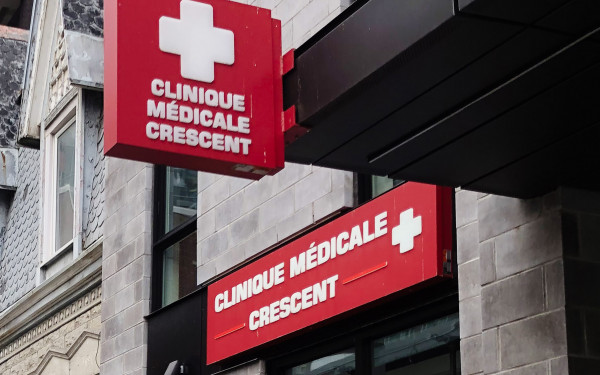Abortion Access in Montreal: An Uphill Battle
The Life-Risking Consequences of Insufficient Reproductive Care
On June 24, the United States Supreme Court overturned Roe v. Wade, a case that made access to abortion services a federal right in the country.
It allowed each state to make its own law on the legality of abortion and its accessibility. The decision sparked major outrage from both the U.S. and people around the world alike. It also led to conversations about the importance of abortion access, leaving many in the dark about their rights.
Abortion in Canada is legal in all provinces and is publicly funded, but the cost varies from province to province. In Quebec, abortion is free for anyone with a Régie de l'assurance maladie du Québec card.
For out-of-province or international students at Concordia, Blue Cross insurance covers fees. Refugees covered under the Interim Federal Health Program will be able to get the service at no cost. Otherwise, clinics might charge differently for their services. For instance, Clinic Medicale Femina would charge a non-insured patient $875.
So, where can you get an abortion?
Quebec has a total of 70 regulated centres that provide abortion services. Some of them are private, others are local community service centres and a few are integrated health and social services centres. All that is required is to call an abortion clinic to schedule an appointment.
It is important to note that Quebec offers two types of abortion services: surgical and medical abortions. The choice is made by the patient after a consultation with a health professional.
Medical abortion is done at home by taking an abortion pill and is usually recommended if the pregnancy is under nine weeks. It consists of two medications: mifepristone and misoprostol. Mifepristone blocks the hormone progesterone needed for a pregnancy to progress, and misoprostol helps the cervix to relax and the uterus to contract to expel the embryo.
Surgical abortion involves surgery and is performed at a clinic. It is usually for patients up to 24 weeks pregnant.
“Luckily, in Montreal, we have access to many clinics,” said Maude Côté-Leduc, a family doctor at the Clinic Medicale Femina. “However, abortion services vary in some other cities and provinces and may not be able to admit you immediately.”
Côté-Leduc added that we shouldn’t overlook society's pressure on patients. “We often hear people say that abortion is used as a birth control method,” she said. “However, I can tell you for certain, coming here as a patient is never an easy decision.”
Society puts a lot of pressure on birth control intake, explained Côté-Leduc. The public blames people who get the service, she explained, yet birth control is seen as something everyone who could get pregnant should take, regardless of its many side effects.
Galya Bravo, vice president of Abortion Rights Coalition of Canada, said there is much to be worked on in the country. In her opinion, the overturning of Roe v. Wade made abortion more salient—instead, Canada needs to broaden the conversation about accessibility.
Diane Yeung, a journalism student at Concordia, believes that Montreal and Canada aren’t socially better than the U.S. “Just because it’s accessible here, doesn’t mean it is [accepted] or normalized,” she added.
Although the U.S. and Canada differ in their abortion rights, there is still much to be worked on.
“I don’t think that necessarily we should worry that abortion will become illegal, but what we do need to worry about is abortion [being] so inaccessible to so many people,” said Bravo.
“There is still so much stigma around abortion, there is still such a profound misunderstanding about the changes the body goes through.” — Galya Bravo
“There is still so much stigma around abortion, there is still such a profound misunderstanding about the changes the body goes through,” Bravo explained. This is why Bravo encourages the use of abortion doulas, a provider of emotional and physical support before, during, and after the abortion.
This service aims to help people like Yeung, who had been in Montreal for a year and a half on a work visa at the time of her abortion and felt isolated due to her family not being in the same country.
In May 2022, the Canadian government announced $3.5 million in funding for abortion care. As encouraging as that is, governmental funding isn’t the only thing needed. More information from the medical community and governmental transparency would benefit those in need of the procedure.
According to Bravo, there is a lack of doctors, physicians, and administrators of abortions acting as strong and clear advocates for the cause within the community. Having vocal medical activists would bypass the need for politicians to speak on the topic.
Mostly clinics—and not hospitals—are the main provider of abortions. This results in civilian donations keeping the clinic up and running, for it to be accessible to everyone.
“I would say my procedure in Montreal was pretty straightforward,” Yeung said. Protesters and doctor intimidation weren’t a part of her experience, she clarified. “[The doctors] didn’t ask me questions,” specified Yeung. “Even with a foreign passport, I wasn’t asked about my status. There wasn’t a sense of pressure around the experience.”
In Bravo’s opinion, this is why education and advocacy for the abortion pill are so needed. “[The abortion pill] is something that you can get in the mail, something that you can do at home, at little to no cost with safety to access and discreet at the same time”, she added.
ARCC advocates for the abortion pill's accessibility, aiming to make it available in pharmacies. For now, the abortion pill can only be taken if you get an appointment with an abortion clinic.
“I think it all comes to education, clarity, and the stigma of persistently being told that it is such an intense and serious procedure.” — Diane Yeung
“It is always portrayed as something traumatic,” Bravo said about the representation of abortions in the media. “But it is never portrayed as just taking a pill in the safety of your own home, experiencing some cramping, and not having to go through with a pregnancy you don’t want or can’t support.”
“I think it all comes to education, clarity, and the stigma of persistently being told that it is such an intense and serious procedure,” Yeung pointed out. “For me, it was an easy decision. This demand for a tragic story is a problem.” For her, abortion is healthcare.
Bravo also talked about the harmfulness of Crisis Pregnancy Centres. She stated these centres are often affiliated with the church and hide behind a pretense of helping people who seek an abortion but steer them in another direction—such as adoption or keeping the child and continuing with the pregnancy. Many of the centres practices were recently criticized due to their pro-life stance.
According to ARCC statistics, almost 22,000 abortions are performed in Quebec per year.
When Yeung was 24, she had to book an appointment with an abortion clinic. “I got scared because, after a failed Plan B, it is possible that the fetus is attached outside of the uterus,” said Yeung. “It could be an ectopic pregnancy, where it could kill you or the baby.” She went in to get a surgical abortion under the impression that she would be fully sedated, but that wasn’t the case. “It was really painful and I was jolted awake,” she added.
Women aren’t the only ones that are struggling with access to abortion. Many people with a uterus—such as transgender men, non-binary individuals, and other members of the LGBTQIA+ community—don’t find medical spaces accepting of them. Countless clinics are only equipped with cisgender women doctors and may not be as comfortable for some members of the community, making it even harder to seek the help they need.
An ARCC report states that 45 per cent of LGBTQIA+ patients have declared having one or more unmet healthcare needs in the past year. An already marginalized community shouldn’t be even more marginalized in healthcare.
This article originally appeared in Volume 43, Issue 5, published October 25, 2022.







